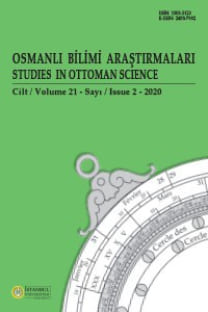Yunanistan'da Bilim Tarihi Çalışmaları
The present article aims to review the development of history of science studies in modern Greece in the 20th century beginning with Michael Stephanides, first professor of history of science at the University of Athens, who represented the a tradition aiming to demonstrate the birth of modern European science in Ancient Greece.The new generation of Greek historians of science who would form the present scientific community appeared in late 1970s. They turned away from the study of Ancient Greek science. Yannis Karas opened a new field, that of the study of the spreading of a scientific knowledge not born in Greece or to the Greek communities of the Ottoman Empire. This field soon interested a great number of scholars who, together with colleagues working on history of science in Europe, constituted the first community of Greek historians of science. The first institution embracing this new field, was the National Hellenic Research Foundation (NHRF) which accepted at the end of the 1970s Yannis Karas as a researcher on history of science. In late 1980s, educational programs were organized in the University of Thessaloniki and National Technical University of Athens. In the beginning of 1990s the Greek Society of History of Science and Technology was created and a “Department of Methodology, History and Theory of Science” newly created at the University of Athens in 1994. The publication of the journal Neusis in 1996 and the Newsletter of History of Science in Southeastern Europe by the NHRF in 1999 widened the communation and exchange of information among historians of science. The post-graduate teaching of history of science at the Department of Education of the University of Athens was organised in 2002. Institutionalisation led to the expansion of the community of Greek historians, and researches are presently carried in line with historiographical trends that are developing in the international community.
Historiography of Science in Greece
The present article aims to review the development of history of science studies in modern Greece in the 20th century beginning with Michael Stephanides, first professor of history of science at the University of Athens, who represented the a tradition aiming to demonstrate the birth of modern European science in Ancient Greece.The new generation of Greek historians of science who would form the present scientific community appeared in late 1970s. They turned away from the study of Ancient Greek science. Yannis Karas opened a new field, that of the study of the spreading of a scientific knowledge not born in Greece or to the Greek communities of the Ottoman Empire. This field soon interested a great number of scholars who, together with colleagues working on history of science in Europe, constituted the first community of Greek historians of science. The first institution embracing this new field, was the National Hellenic Research Foundation (NHRF) which accepted at the end of the 1970s Yannis Karas as a researcher on history of science. In late 1980s, educational programs were organized in the University of Thessaloniki and National Technical University of Athens. In the beginning of 1990s the Greek Society of History of Science and Technology was created and a “Department of Methodology, History and Theory of Science” newly created at the University of Athens in 1994. The publication of the journal Neusis in 1996 and the Newsletter of History of Science in Southeastern Europe by the NHRF in 1999 widened the communation and exchange of information among historians of science. The post-graduate teaching of history of science at the Department of Education of the University of Athens was organised in 2002. Institutionalisation led to the expansion of the community of Greek historians, and researches are presently carried in line with historiographical trends that are developing in the international community.
___
- ISSN: 1303-3123
- Yayın Aralığı: Yılda 2 Sayı
- Başlangıç: 1995
- Yayıncı: İstanbul Üniversitesi Edebiyat Fakültesi
Sayıdaki Diğer Makaleler
Küreselleşme ve Zanaatçı-Teknoloji Ustalarının Çaresizliği
Yunanistan'da Bilim Tarihi Çalışmaları
XIX. Yüzyılın İlk Yarısında Anadolu'da Bir Bitki Toplayıcısı: Rémi Aucher-Eloy (1793-1838)
El-Cezeri'nin Batar Türden Bir Süreölçeri (Tarcahar)
Atilla BİR, Mustafa KAÇAR, Mahmut KAYRAL
Rasathane-i Amire Binası İçin 1895 Projeleri
Veteriner Hekimliği Arşivinden Bir Örnek: Fazlı Faik Yeğül'ün Otobiyografisi
Istanbul'da Nöbet Mahalleri- Nöbet Eczaneleri (1845-1895)
Miken Arabalarının Teknoloji Tarihi Açısından Değerlendirilmesi
Atilla BİR, Gaye ERGİNÖZ ŞAHİNBAŞ
Health and Therapeutics in the Byzantine and Ottoman Periods
